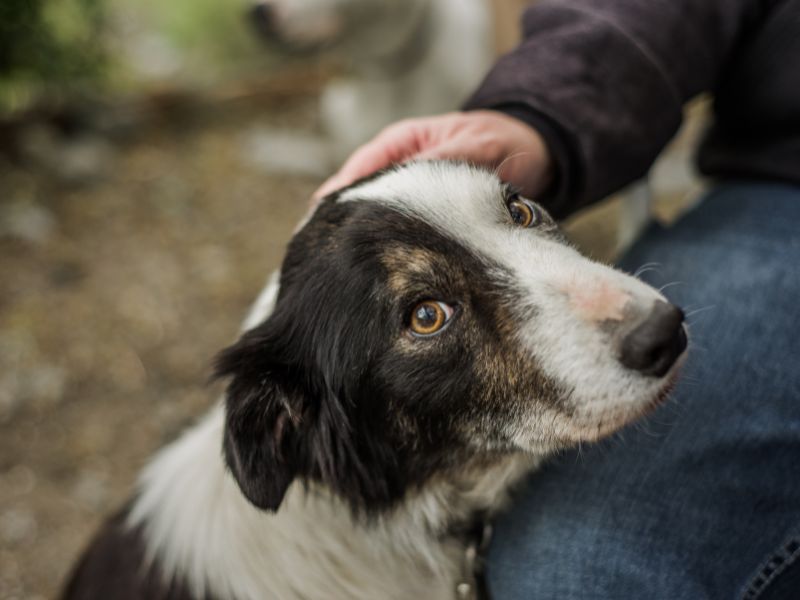Every dog parent’s priority is ensuring their furry friend’s well-being. Among the tons of challenges dogs face, anxiety often lurks in the shadows. Just like it is with humans, the roots of canine anxiety are intricate and intertwined with both psychological and physiological factors. That’s why when you’re looking at how you can help your dog’s anxiety, you want to start with ensuring they have the best gut health. Gut health supplements can go a long way in helping your dog’s anxiety, but it’s important to know what to look for.
Signs Of An Anxious Dog
Recognizing dog anxiety in our best friends isn’t always straightforward. In fact, anxiety often appears in different, unexpected ways. Consider the following signs of anxiety in dogs:
- Behavioral Changes and Destructiveness: One of the most glaring indicators of anxiety in dogs is a sudden shift in their behavior. A typically calm dog might become agitated, while an active dog might appear unusually subdued. More, destructive behaviors like chewing on furniture, shoes, or other household items can be a clear cry for help. This destructiveness isn’t just limited to objects; some dogs might even resort to self-harm, like excessive licking or biting of their paws or tails, which can lead to skin infections or other complications.
- Vocal Indicators and Restlessness: Anxious dogs often become more vocal. This can manifest as excessive barking, whining, or even howling, especially when left alone. It’s their way of expressing discomfort or calling out for attention and reassurance. Along with this, you might notice your dog pacing around the house, unable to settle down in one place. This restlessness, especially if it’s out of character, is a sign that they’re struggling to cope with their big feelings.
- Physical Symptoms and Changes in Body Language: Just like humans, dogs can display physical symptoms when they’re anxious. These include trembling, panting, and drooling even when it’s not hot or they haven’t exerted themselves. Their body language can also give away their emotional state. Ears pinned back, a tucked tail, dilated pupils, or frequent yawning can all indicate that your dog is feeling stressed. An anxious dog might also frequently lick its lips or appear to be constantly scanning its surroundings because they’re just unable to relax.
- Changes in Eating and Potty Habits: Anxiety can take a toll on a dog’s appetite. A stressed dog might skip meals, eat less than usual, or, in some cases, gobble down food more quickly. On the other hand, some dogs might start eating non-food items, a condition known as pica. In addition to these eating issues, changes in their bathroom habits can also show signs of anxiety. This includes having accidents indoors despite being toilet trained or frequent urination in small amounts.
- Social Changes and Aggression: A previously sociable dog might become withdrawn, avoiding interaction with other pets or even its human family members. They might prefer hiding in a secluded spot or show reluctance in engaging in activities they once enjoyed. Conversely, anxiety can also lead to aggression. A dog that feels cornered by its own emotions might growl, snap, or bite when approached, even if it has never displayed such behaviors before.
Dog Anxiety and the Canine Brain
At the heart of anxiety in dogs is the dog’s limbic system. It is part of their central nervous system that is similar to the human limbic system and is a complex set of brain structures that’s responsible for emotions, memories, and behavior. Think of it as the emotional processing center of your dog. When a dog experiences traumatic events or significant changes, the limbic system can become overstimulated. As an example, if a dog was previously abandoned, the act of their current owner leaving for work could trigger an overactive response from the limbic system, manifesting as separation anxiety or an anxiety disorder.
And while the gut and brain may seem unrelated, they are actually in constant communication. This bidirectional communication channel, known as the gut-brain axis, means that disturbances in the gut can directly influence brain function and behavior. It’s like a feedback loop where the gut sends signals to the brain about normal behavior and vice versa.
Diving Deeper Into Gut Health and Anxiety In Dogs
So how exactly does an imbalanced gut lead to heightened anxiety in dogs? A disrupted gut can lead to an imbalance in neurotransmitters, which are the brain’s chemical messengers. For instance, a decline in beneficial gut bacteria can reduce the production of serotonin, a neurotransmitter that regulates mood, sleep, and appetite. With decreased serotonin, feelings of fear and anxiety can grow and overwhelm your dog.
Your dog’s gut has a diverse community of bacteria, all of which play pivotal roles–from aiding digestion to producing vital neurotransmitters for other bodily functions. When this bacterial balance is thrown off and harmful bacteria outnumber the beneficial ones, it can disrupt the gut’s harmony. This can lead to physical and emotional distress and is often a stem of anxiety in dogs. That’s why it’s so important that your dog’s gut health is in good shape. Their gut being healthy is one of the best ways to help a dog cope with anxiety, and a veterinary behaviorist will often look at a dog’s diet even before they begin behavior modification for anxious behavior.
Supplementing For a Healthy Gut and Happy Dog
Ensuring your dog’s gut health is optimal can significantly reduce anxiety symptoms. This is where dog gut health supplements, especially ones packed with fiber, prebiotics, probiotics, and digestive enzymes, come into play. Natural dog calming supplements that focus on gut health are a support system. When you support your dog’s healthy gut, you’re helping ensure the gut-brain axis remains well-cared for.
So, just how can supplements help reduce anxiety in dogs? We’re glad you asked!
- Prebiotics – The Backbone of a Healthy Gut: While probiotics may often be considered stars of the digestive supplement world, prebiotics are the unsung heroes. They are food for beneficial bacteria, and they ensure the gut’s bacterial community thrives, leading to healthier gut-brain communication and reduced anxiety in dogs.
- Probiotics and Their Magic: Probiotics are like reinforcements for the good bacteria in the gut. By introducing them to your dog’s diet, you’re ensuring a more balanced gut microbiota. This balance is super important for optimal neurotransmitter production, which in turn plays a direct role in their mood regulation and anxiety reduction.
- Fiber’s Dual Role: Fiber isn’t just about aiding your dog’s digestion; it’s important for helping reduce dog anxiety as well. When fiber is broken down in the gut, it produces short-chain fatty acids. These compounds have a protective role–reducing inflammation, which can disrupt the gut-brain axis. Moreover, these fatty acids enhance the blood-brain barrier’s integrity. This is a fancy way of saying they make sure harmful substances are kept away from your dog’s brain, which helps give them better mental health and clarity.
- Digestive Enzymes: These are not just proteins; they are essential for breaking down food into nutrients the body can absorb. Optimal nutrient absorption means that your dog will not just get all they’re supposed to from the food they eat, but they’ll likely reduce the chances of gut disturbances, too. This helps ensure a happy and healthy gut-brain relationship.
Our dogs may seem to have never-ending wagging tails and boundless energy, but they rely on us to understand and take care of their health needs. When we understand the link between gut health and anxiety, we can take proactive measures like giving health supplements to help dog anxiety. This is how we dog owners help pave the way for them to lead their best, most joy-filled lives!


